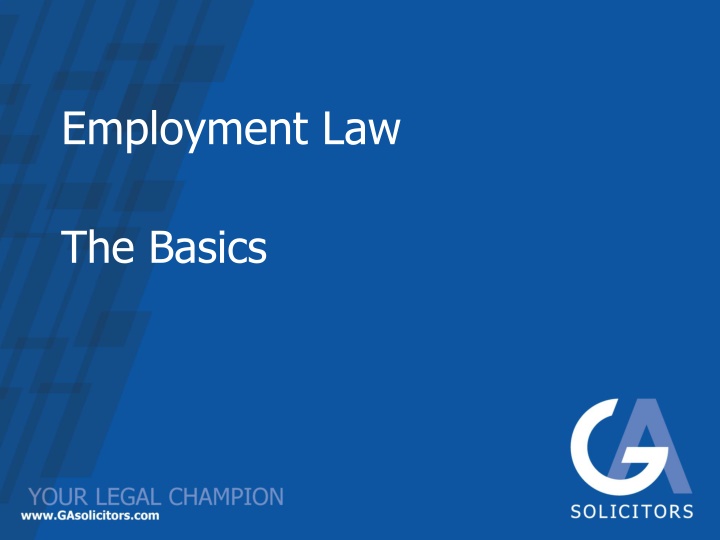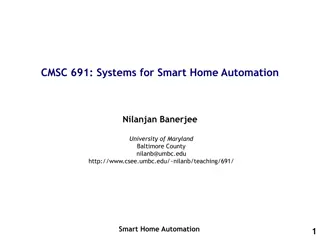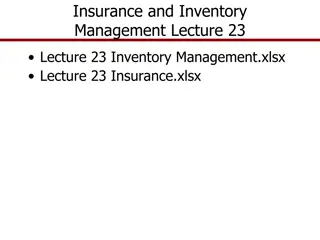
Employment Law Basics: Understanding Statement of Particulars and Contracts
Explore the legal requirements for providing statement of particulars to new employees under the Employment Rights Act 1996. Learn about the significance of contracts of employment, statutory notice periods, and deductions from wages. Discover the essentials of intellectual property rights in the workplace.
Download Presentation

Please find below an Image/Link to download the presentation.
The content on the website is provided AS IS for your information and personal use only. It may not be sold, licensed, or shared on other websites without obtaining consent from the author. If you encounter any issues during the download, it is possible that the publisher has removed the file from their server.
You are allowed to download the files provided on this website for personal or commercial use, subject to the condition that they are used lawfully. All files are the property of their respective owners.
The content on the website is provided AS IS for your information and personal use only. It may not be sold, licensed, or shared on other websites without obtaining consent from the author.
E N D
Presentation Transcript
Employment Law The Basics
Introduction Purpose of today The Basics Recent Developments Your Pack Timings
Employment Department Rhiain Lewis, Head of Department Robert Zacal, Solicitor
Section 1 Statement of Particulars Legal Requirement Section 1 of the Employment Rights Act 1996 Must be provided to new employees within 2 months of the start date
What is a S.1 Statement of Particulars? Summary of key terms of employment Names of the parties Start date Start date of continuous employment Salary Pay dates Hours Holiday, sick pay, pension entitlement Notice Job Title Permanent or fixed term Any collective agreements
Failure to Provide Failure = Potential Employment Tribunal claim 2 4 weeks gross wages Bigger Issue - Confusion!
Contracts of Employment Crucial! More detailed than a S.1 Statement of Particulars Covers anything needed
Notice - Employers Statutory Minimum Notice Section 86 of the Employment Rights Act 1996 Employer: 1 week after someone has been employed for one month. 1 week for each complete year after 2 years. Maximum of 12 weeks notice.
Notice - Employees 1 weeks notice Regardless of length of employment
Deductions from Wages When can they be made? Now? No!
Deduction from Wages Permitted deductions tax and national insurance All other deductions require written consent Solution Contract!
Intellectual Property Developed in the workplace Who owns it? Confusion Solution Contract!
Training Costs Employer pays for training Employee resigns soon after training Employer is out of pocket Training costs clause within a contract
Restrictive Covenants Prevents employees leaving and competing and damaging the business. Common types Non compete Non solicitation of business Non solicitation of employees Reasonableness Duration Appropriate
Employment Tribunal Deals with employment disputes Fees employees must pay: Issuing Fees between 160 and 250 Hearing Fees between 230 and 950 Claims down by 70-80% Appeals unsuccessful Reforms under review
ACAS Early Conciliation Employee must do this before they can make a claim Lasts for 1 month Purpose is to seek to resolve disputes before a claim is issued to the Employment Tribunal
Limitation Periods 3 months less one day from date of: Dismissal Deduction of Wages Act of Discrimination Extended by ACAS Early Conciliation
Unfair Dismissal Unfair Dismissal Qualifying Service = 2 years employment Automatic Unfair Dismissal = no minimum qualifying service Disciplinary Process Fair Reasons Conduct Capability/Performance Redundancy Statutory Restriction Some Other Substantial Reason Not retirement = age discrimination
Unfair Dismissal Awards Compensation - maximum = lower of 12 months pay or 78,335 Unlimited compensation for automatic unfair dismissal Basic Award formula based on length of service and pay Repay Tribunal Fees Legal Fees Not generally recoverable Legal Expenses Insurance
Discrimination Protected Characteristics Age Disability Gender Reassignment Marriage and civil partnership Pregnancy and maternity Race Religion and Belief Sex Sexual Orientation
Discrimination No qualifying service Awards unlimited Legal Fees not generally recoverable Can be brought against organisations and individuals
Social Media Increasing impact on employment ACAS Guidance - www.acas.org.uk/index.aspx?articleid=3375
Social Media No settled rules or approach from the Employment Tribunal Important to have a clear policy on use of social media in and out of work Conflicting case law: Walters v Asda Stores Limited Preece v JD Wetherspoons plc Social media use outside of work Pay v United Kingdom Game Retail Limited v Laws
Overtime and Holiday Pay Bear Scotland case November 2014 Impact = holiday pay should be calculated to include overtime Guaranteed overtime Voluntary overtime? Yes, in the non binding Northern Ireland case of Patterson v Castlereagh Borough Council Unclear at present Appeal expected 8 & 9 December 2015
Overtime and Holiday Pay Calculations Unclear Suggested approach is average earnings over previous 12 weeks Deductions must be no more than 3 months apart Employees can only go back two years
Shared Parental Leave What is Shared Parental Leave (SPL)? Leave to enable parents to share the care of the child flexibly in its first year Applies to babies due after 5 April 2015 Maximum of 50 weeks can be shared Right to make 3 bookings Continuous leave must be granted Request for discontinuous can be refused
Shared Parental Leave What is Shared Parental Pay (SPP)? Separate right from SPL with different eligibility criteria Maximum of 37 weeks can be shared Current statutory rate of 139.58 Very complicated rules! May be extended to grandparents Little take up
Living Wage & National Minimum Wage Government attempt to increase earnings Current National Minimum Wage = 6.70 per hour Living Wage of 7.20 per hour to come in on 6 April 2016 Aim by 2020 is 9.00 per hour Failure to pay Unlawful deduction of wages claims Criminal and civil penalties Naming and shaming
Peripatetic Employees Recent European case Tyco Case (Federacion de Servicios Privados del sindicato Comisiones Obreras v Tyco Integrated Security SL and another) Workers with no fixed place of work, who travel for work should be paid for journeys to first appointments and home from last appointment Salespeople Care workers
Any Questions? Rob Zacal, Employment Solicitor, GA Solicitors LLP 01752 513549 or robert.zacal@gasolicitors.com
GA Solicitors A team to rely on If you need a solicitor, the chances are you need help with a problem. Don t worry, you re in safe hands.* Whether you are from a publicly quoted company or a small family business; from the public sector or a private individual, you will appreciate and value our top-flight legal advice, outstanding service and straightforward approach. We have teams of specialists to help you with: *In a recent survey 100% of our clients rated our service as good or excellent.
Disclaimer This presentation constitutes only a summary of the aspects of employment law(and is up to date as at 4 November 2015). GA Solicitors will not be held liable for any reliance on this presentation.






















